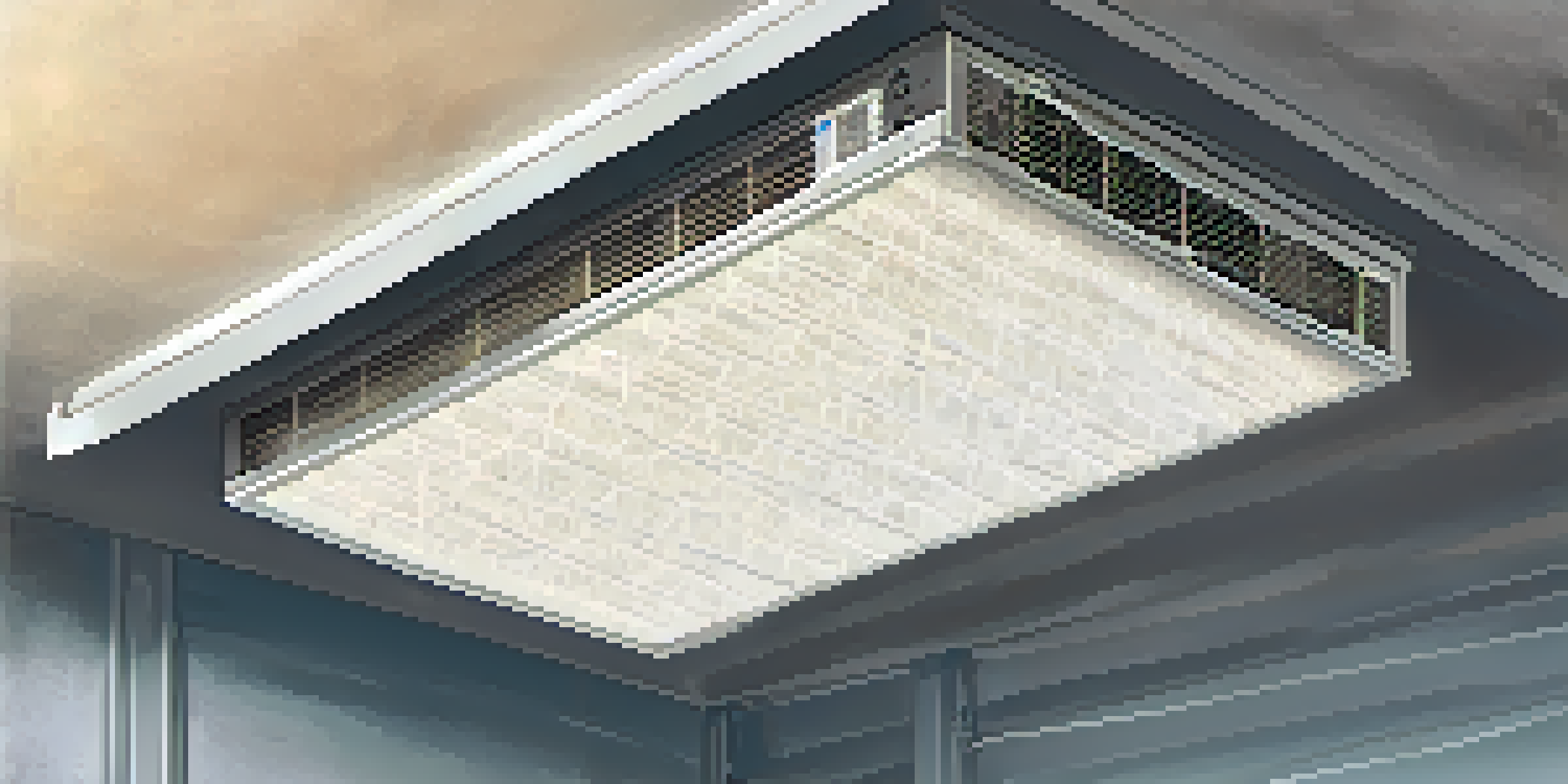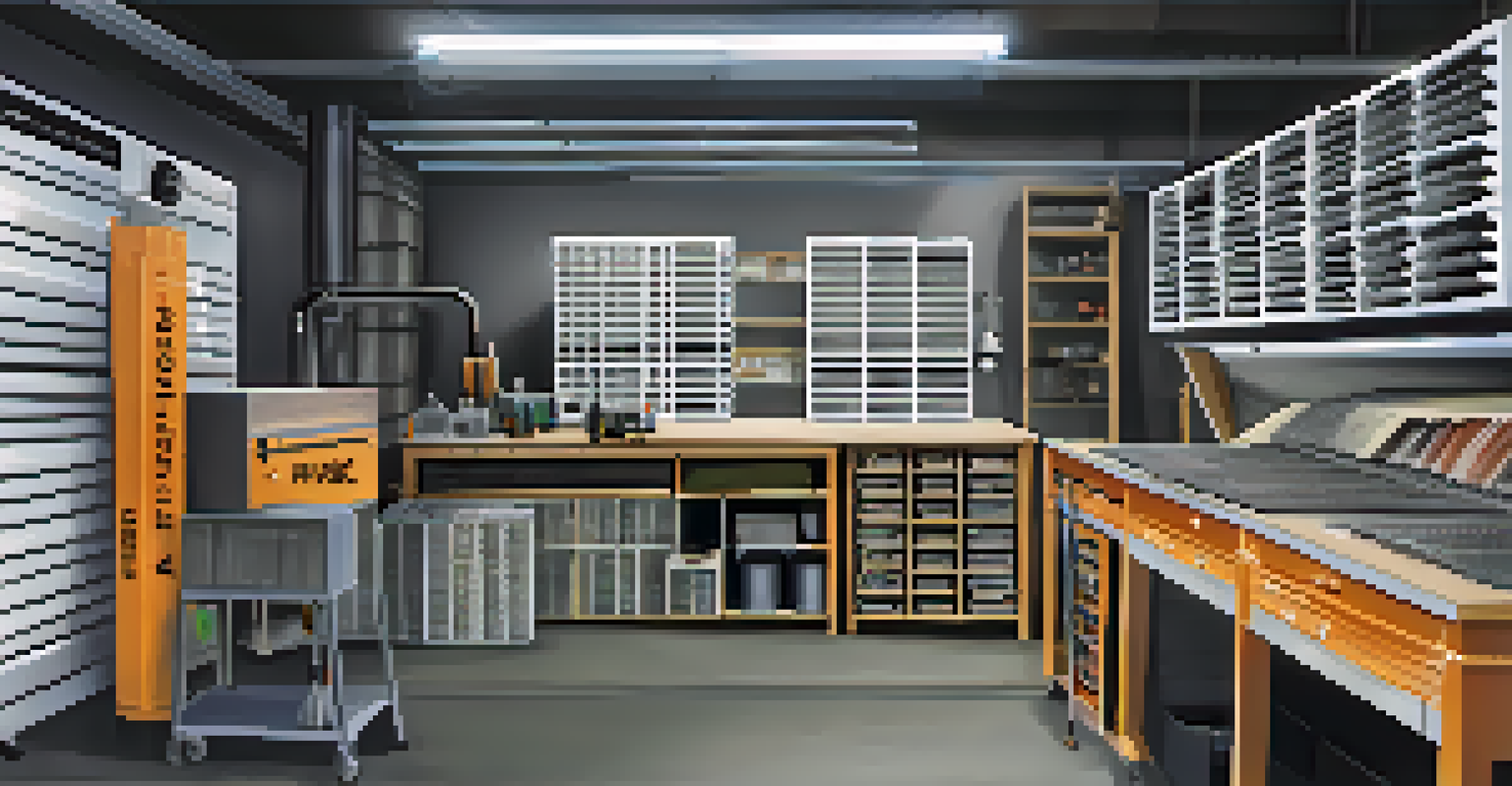How to Choose the Best Energy-Efficient HVAC Filters

Understanding HVAC Filters and Their Importance
HVAC filters are crucial for maintaining indoor air quality and system efficiency. They trap dust, allergens, and other pollutants, ensuring that the air you breathe is cleaner. A good filter can also help your HVAC system run more efficiently, which could lower your energy bills.
The air we breathe is essential for our health, and poor indoor air quality can lead to serious health issues.
When you choose the right filter, you're not just protecting your health; you're also enhancing the lifespan of your HVAC system. Dirty filters can lead to increased energy consumption and costly repairs. So, understanding the role of filters is the first step towards making an informed choice.
With so many options available, it's essential to recognize that not all filters are created equal. Factors like MERV rating, filter type, and size play significant roles in their effectiveness and efficiency. Let’s dive into what you should consider when selecting the best energy-efficient HVAC filters.
Know Your MERV Rating: What It Means for You
MERV stands for Minimum Efficiency Reporting Value, and it’s a critical factor to consider when choosing filter efficiency. MERV ratings can range from 1 to 16, with higher numbers indicating better filtration. A filter with a MERV rating of 8 to 12 usually provides a good balance between air quality and airflow.

Higher MERV ratings mean better filtration, but they can also restrict airflow if your HVAC system isn’t designed for it. This is like trying to drink a thick milkshake through a tiny straw; it might be delicious, but it’s a struggle! Therefore, it’s essential to find a filter that suits both your air quality needs and your system’s capabilities.
Importance of HVAC Filters
HVAC filters are essential for improving indoor air quality and enhancing system efficiency, ultimately saving you money.
Before purchasing, check your HVAC system’s specifications to determine the maximum MERV rating it can handle. This ensures you’ll enjoy clean air without compromising system performance. Understanding MERV ratings is vital in making an informed choice for your home.
Types of HVAC Filters: What Are Your Options?
When it comes to HVAC filters, there are several types to choose from, each with its own benefits. Fiberglass filters are the most basic and inexpensive option, but they don’t trap smaller particles effectively. On the other hand, pleated filters offer better filtration and can last longer, making them a popular choice among homeowners.
Investing in quality filters is not just about saving money; it’s about ensuring a healthy environment for you and your family.
Another option is HEPA filters, which are excellent for trapping allergens and fine particles. These filters can provide top-notch air quality, but they may be more expensive and can restrict airflow if not used correctly. Knowing the different types helps you weigh the pros and cons for your specific needs.
Lastly, consider electrostatic filters, which use static electricity to attract particles. They are reusable and can offer significant savings over time. Each type has its unique advantages, so think about what matters most to you before making a decision.
Consider Filter Size: The Right Fit Matters
Choosing the right size filter is crucial for optimal performance. A filter that’s too small will allow unfiltered air to bypass it, while one that’s too large can cause airflow issues. Always check the dimensions of your existing filter or consult your HVAC system’s manual to ensure a proper fit.
Installing a filter that doesn’t fit correctly is like wearing shoes that are too big or too small; they just won’t perform as intended. Many homeowners overlook this aspect, but it can significantly impact both air quality and system efficiency. A well-fitting filter will enhance airflow and ensure your HVAC system works at its best.
Understanding MERV Ratings
MERV ratings indicate filter efficiency, with higher numbers providing better air quality but requiring compatibility with your HVAC system.
If you’re unsure about the size, take a quick measurement or check the existing filter for its dimensions. It’s a simple step that can save you time and frustration down the line. Remember, a proper fit is essential for enjoying the full benefits of your energy-efficient HVAC filters.
Evaluating Filter Lifespan: How Often to Replace
The lifespan of HVAC filters can vary based on several factors, including the type of filter, usage, and the environment. Some filters last a month, while others can go up to six months or more. Regularly checking and replacing your filters is vital to maintaining air quality and system efficiency.
A good rule of thumb is to replace disposable filters every 1-3 months, depending on factors like pets, allergies, and dust levels in your home. If you have pets or live in a dusty area, you might need to change them more frequently. Keeping an eye on your filter can help you avoid the pitfalls of reduced performance.
Consider marking your calendar or setting reminders to check your filters regularly. This simple habit can go a long way in ensuring your HVAC system runs smoothly and efficiently. By staying on top of filter changes, you’ll be investing in your home’s comfort and health.
Energy-Efficiency Ratings: What to Look For
When selecting HVAC filters, look for energy-efficiency ratings that indicate how well they perform. Some filters are designed to minimize energy loss, which can contribute to lower utility bills. The best filters will not only improve air quality but also help your HVAC system operate efficiently.
Energy Star certifications are a good indicator of quality, as they signify that a product meets strict energy efficiency guidelines. Choosing filters with these certifications can give you peace of mind knowing you're making a responsible choice for both your home and the environment. It’s like choosing the best ingredients for a delicious meal; quality matters!
Choosing the Right Filter Type
Selecting the appropriate type of HVAC filter—like pleated or HEPA—can significantly impact both air quality and system performance.
Additionally, consider the long-term savings versus the initial cost. Higher-quality filters may have a higher upfront price but can save you money in the long run through energy savings and reduced maintenance costs. Making an informed choice will ultimately benefit your wallet and your home’s air quality.
Budget Considerations: Finding the Right Balance
While it’s tempting to choose the cheapest option on the market, investing in quality HVAC filters can pay off in the long run. Balance your budget with the benefits of more effective filters, which can improve air quality and system efficiency. Sometimes, spending a little more upfront can save you significantly on energy bills and repairs later.
When comparing prices, consider not just the initial cost but also the lifespan and effectiveness of the filters. A more expensive filter that lasts longer might be a better investment than frequently replacing a cheaper one. It’s like buying a sturdy pair of shoes that last years instead of several pairs that wear out quickly.

Don't forget to factor in any specific needs you might have, such as allergies or pets, which may require a higher quality filter. Taking the time to evaluate your options can lead you to the right balance between cost and performance, ensuring you get the best value for your investment.